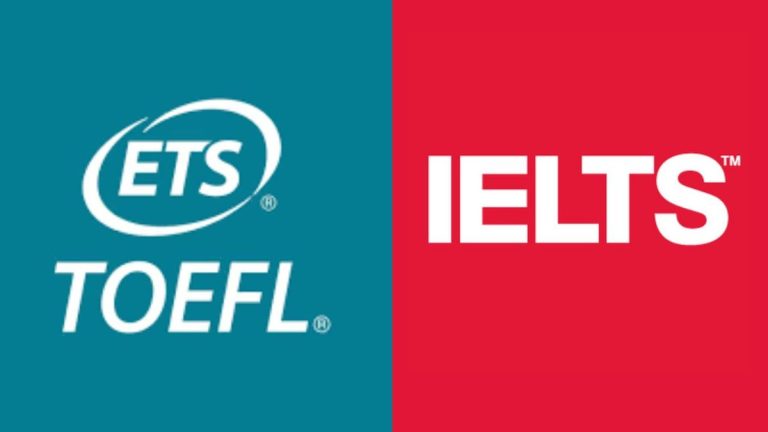TOEFL or IELTS | Which is Better?
Are you bothered about choosing between TOEFL or IELTS?
TOEFL and IELTS are two prominent English Proficiency exams that come to mind when planning to study abroad as an international student or immigrate abroad via the job route.
TOEFL or IELTS: A Brief Overview
Although there are some scholarship that do not require IELTS or TOEFL, writing either of the exams gives an applicant a better chance of getting selected.
The Test Of English as a Foreign Language (TOEFL) is administered by the Educational Testing Service (ETS), a private testing and assessment organization headquartered in New Jersey, United States.
The TOEFL is primarily required for academic purposes and measures the ability to use and comprehend the English Language in an academic setting.
On the other hand, IELTS (International English Language Testing System) is jointly managed by the British Council, IDP Education, IELTS Australia, and Cambridge Assessment English.
IELTS can be used for educational, immigration, and professional purposes. It assesses the listening, speaking, writing, and reading skills of the applicant.
We will be comparing and contrasting both proficiency exams in the following paragraphs;
TOEFL vs IELTS: Similarities and Differences
TOEFL is accepted by over 11,000 institutions in more than 150 countries, including the United States, Canada, the United Kingdom, Australia, and New Zealand. It is widely recognized for academic purposes, especially in the US.
IELTS is accepted by over 10,000 organizations worldwide, including universities, employers, immigration authorities, and professional bodies. It is particularly popular in countries like the UK, Australia, Canada, and New Zealand.
TOEFL or IELTS: Mode of Conduct
The mode of conduct of the exam is an important factor to consider when choosing English proficiency tests.
This enables the applicant to practise adequately using the appropriate materials.
- TOEFL Mode of Conduct
TOEFL is predominantly offered as an internet-based test (iBT) and can be taken at both test centres and at home proctor-monitored. The TOEFL iBT includes integrated tasks that test speaking, listening, reading, and writing skills.
In areas where there is no internet connectivity, however, the ETS may organise a paper-based test for some candidates.
- IELTS Mode of Conduct
IELTS offers two versions; IELTS Academic for (students and researchers) and IELTS General Training (for professionals and immigration purposes).
Both versions are available in the traditional paper-based and the computer-based tests. IELTS can also be taken at home in a well-lit space with a stable internet connection.
However, the speaking section is conducted face-to-face with an examiner.
Our Verdict: If you prefer a face-to-face speaking test, IELTS may be a better fit. If you are comfortable with computer-based tests, TOEFL iBT is more suitable.
TOEFL vs IELTS: Cost of Registration
The TOEFL iBT generally costs between $160 and $250, depending on the test location. Extra fees are charged for additional services such as rescheduling, score reviews, and additional score reports.
The cost of taking the IELTS varies by country but typically ranges from $215 to $240. Additional fees may apply for services like test rescheduling, extra score reports, and test cancellations.
TOEFL vs IELTS: Number of Questions
TOEFL iBT includes four sections: Reading, Listening, Speaking, and Writing. The Reading section typically has 36 to 56 questions, the Listening section has 34 to 51 questions, the Speaking section consists of six tasks, and the Writing section includes two tasks.
IELTS consists of four sections: Listening, Reading, Writing, and Speaking. The Listening section has 40 questions, the Reading section has 40 questions, the Writing section includes two tasks, and the Speaking section involves a face-to-face interview with three parts.
TOEFL vs IELTS: Validity
Both IELTS and TOEFL scores are valid for two years from the test date. This period ensures that the scores accurately reflect the test taker’s current English language abilities.
TOEFL vs IELTS: Scoring Systems
- IELTS Scoring System
The International English Language Testing System (IELTS) uses a band scale from 0 to 9 to assess proficiency. Each of the four sections—Listening, Reading, Writing, and Speaking—is scored individually. The final score, known as the overall band score, is the average of these four section scores, rounded to the nearest whole or half band.
- TOEFL Scoring System
The Test of English as a Foreign Language (TOEFL) uses a different approach. The TOEFL iBT scores each section—Reading, Listening, Speaking, and Writing—on a scale of 0 to 30. The total score, which ranges from 0 to 120, is the sum of the scores from the four sections.
TOEFL vs IELTS: Score Comparison
TOEFL:
- 118-120: Expert user (equivalent to IELTS Band 9)
- 110-117: Very good user (equivalent to IELTS Band 8)
- 94-109: Good user (equivalent to IELTS Band 7)
- 60-93: Competent to modest user (equivalent to IELTS Band 6 to Band 5)
- 46-59: Limited user (equivalent to IELTS Band 4)
- 32-45: Extremely limited user (equivalent to IELTS Band 3)
- 0-31: Intermittent to non-user (equivalent to IELTS Band 2 to Band 1)
IELTS:
- Band 9: Expert user
- Band 8: Very good user
- Band 7: Good user
- Band 6: Competent user
- Band 5: Modest user
- Band 4: Limited user
- Band 3: Extremely limited user
- Band 2: Intermittent user
- Band 1: Non-user
- Band 0: Did not attempt the test
TOEFL vs IELTS: Preparation
Preparing for the IELTS involves focused practice in listening, reading, writing, and speaking skills. Numerous resources, including practice tests, books, and online courses, are available to aid in preparation.
Preparing for the TOEFL requires enhancing reading comprehension, listening abilities, speaking fluency, and writing proficiency. ETS provides official preparation materials, and many other resources are available to help students prepare effectively.
IELTS vs TOEFL: Retake Policy
Both exams allow for retakes. The IELTS can be retaken as soon as you feel ready. There are no restrictions on the number of attempts. The TOEFL iBT can be retaken after a minimum of three days from the previous test date.
TOEFL or IELTS: Which Test Should You Choose?
Choosing between the IELTS and TOEFL depends on your personal preferences, academic goals, and the requirements of the institutions you are applying to. Consider the following factors:
- Test Format: If you prefer a face-to-face speaking test, IELTS may be a better fit. If you are comfortable with computer-based tests, TOEFL iBT could be more suitable.
- Location and Availability: Check the availability of test centers for both exams in your area. Consider the convenience of test dates and locations.
- Institution Requirements: Verify the preferred or required test for the universities or organizations you are applying to. Some institutions accept both, while others may have a preference.
- Preparation Style: Reflect on your strengths and weaknesses in English proficiency. Choose the test that aligns better with your skills and preparation style.
Frequently Asked Questions About TOEFL or IELTS
Is TOEFL accepted by UK universities?
Yes. The TOEFL iBT is accepted by all universities in the United Kingdom for admission purposes.
Can TOEFL be used for UK Visa?
Yes. TOEFL is accepted for UK Visa application, though IELTS is the most common in the UK.
Can I take both IELTS and TOEFL?
One of either TOEFL or iELTS is sufficient for admission, employment, or immigration purposes. Taking and passing both exams strengthen your application and gives you a high chance of selection or approval.
Which Countries require IELTS or TOEFL for International Students?
Generally, international students from non-English speaking countries willing to study in the United States, United Kingdom, Australia, New Zealand, Canada, United Arab Emirates, Saudi Arabia, are required to submit English test scores.
What is the minimum TOEFL or IELTS Score?
The minimum score required for IELTS or TOEFL is set by the university or host country you intend to study or immigrate to.
Conclusion
Both IELTS and TOEFL are globally recognized and accepted English proficiency tests. They assess the same fundamental skills but differ in format, cost, scoring, and other parameters.
This post has been written to give a deep insight into the details of both exams. Your choice should align with your academic or professional goals, ensuring the best fit for your future endeavors.
If you find this post educative and useful, share with family and friends on other platforms.
Source: Scholarshipregion




